Fascinated by Gallo-Roman history? Click Here to download > > > Here are 6 ways Rome affected France
- Home ›
- Destinations ›
- Southern France ›
- Is Marseille Safe?
Is Marseille Safe? Or Is The City As Dangerous As They Say?
Published 03 March 2024 by Leyla Alyanak — Parisian by birth, Lyonnaise by adoption, historian by passion
Let’s face it – Marseille has a “reputation” as one of the most dangerous cities in Europe. Is this fact or hype? I spent a week in the city to see for myself and discovered a vibrant, colorful city well worth the visit.
Should you be scared to visit Marseille?
Or is the city simply getting a bad rap?
Is Marseille dangerous?
If you search online for safety in Marseille, this is typical of what you’ll find:
- “Street crime is very frequent.”
- “The city is too much to handle.”
- “It is certainly more dangerous than other places in Europe.”
Statistics would seem to back this up.
Numbeo places Marseille at #2 for crime rates among European cities, and #1 in France. This statistic has been amplified and relayed by media worldwide, painting a picture of a city under the constant hail of bullets. Yet it isn’t a scientific study – these figures reflect how people who were surveyed feel about their city’s safety – and those surveyed are not necessarily all locals.
Another survey concurs (you’ll find results here if you read French): according to this one, 85% of Marseille residents express “feelings of insecurity”, 50% of them “often” or “very often”.
It is true that Marseille witnesses more violent crime than its share, and gang warfare is front-page news. In 2023 alone, 48 people were killed in gang wars.
But please keep reading, because there's a lot more to this story.
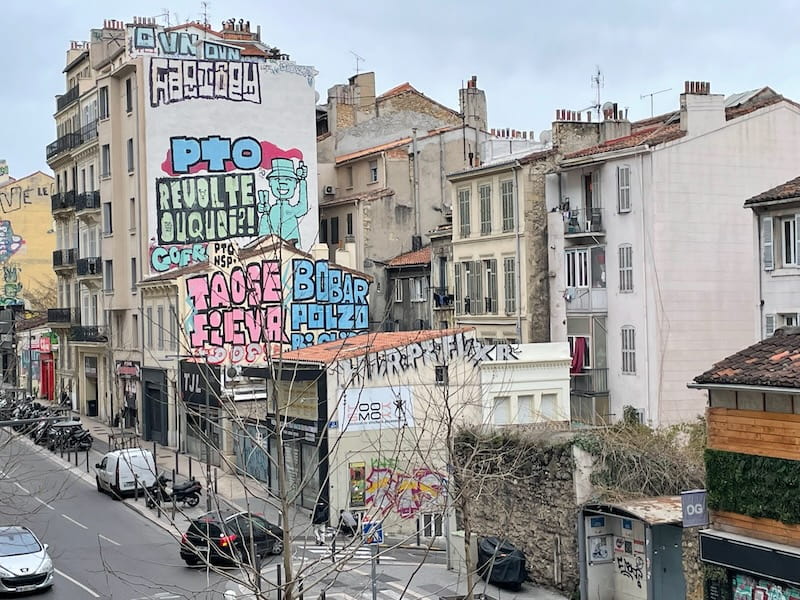 A street in downtown Marseille - graffiti is almost impossible to escape ©Leyla Alyanak/OffbeatFrance
A street in downtown Marseille - graffiti is almost impossible to escape ©Leyla Alyanak/OffbeatFranceThe other side of the coin
Take Ville-Data, which uses some official crime statistics (but tends to lag a year or two behind): it records that major cities like Paris or Lille have more crimes per 1000 inhabitants than Marseille.
According to Ville-Data, in 2023 Marseille ranked #13 for crime in French cities, surpassed by Paris and Lille but also by Lyon, Grenoble, Bordeaux…
According to these figures, Marseille is no more or less dangerous than other major French cities.
So I kept digging and beneath the hype, I found comments like these:
- “It's safer than virtually every major city in the United States.”
- “It is typically safe to walk around Marseille at night.”
- “Marseille is not more dangerous than other big cities in the world.”
According to Made in Marseille, a local blog (in French), the dangers are vastly overblown.
“Contrary to popular belief and the city's bad reputation, walking around Marseille is no more risky than walking around Paris, Barcelona, Rome or other major European metropolises. Running into trouble on every street corner is a myth and does not correspond at all to reality on the ground.”
So here we have them, two diametrically opposed assessments of Marseille.
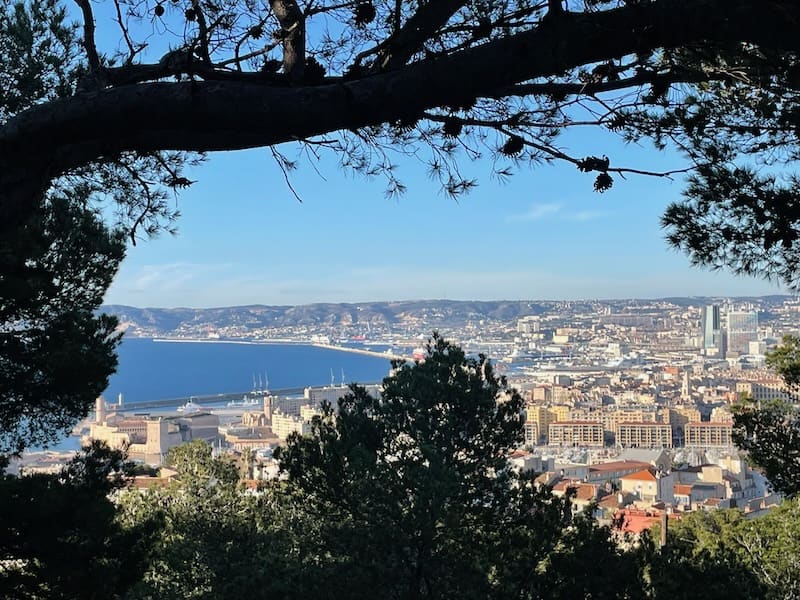
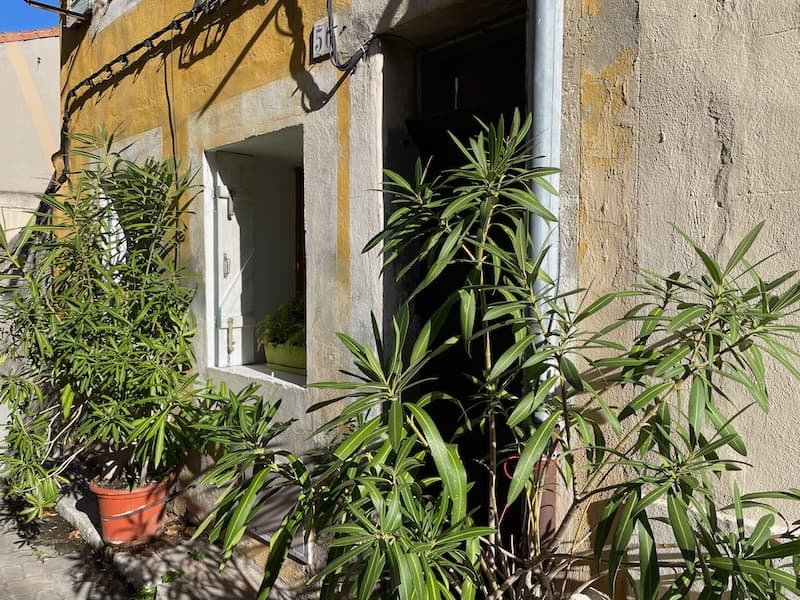 Two lovely views of Marseille. Top: sweeping view of the bay as seen from the Basilica Notre-Dame de la Garde. Bottom: a sunny street in Le Panier neighborhood. ©Leyla Alyanak/OffbeatFrance
Two lovely views of Marseille. Top: sweeping view of the bay as seen from the Basilica Notre-Dame de la Garde. Bottom: a sunny street in Le Panier neighborhood. ©Leyla Alyanak/OffbeatFranceMarseille is stuck with its history
There are reasons Marseille has a “reputation”.
The city of Marseille is a port, which saw the rapid development of illegal trafficking of various sorts starting in the 19th century, with an eventual takeover by mafia figures.
Movies like The French Connection helped cement Marseille’s reputation as a drug-riddled, gangster-shooting city, and the fact that the film was based on a true story didn’t help.
Each time there’s a peak in violence, authorities try to muscle in and change things, but nothing seems to stick. When one drug lord is arrested, another takes his place, and when one network is dismantled, it doesn’t take long for a new one to emerge.
Contributing to Marseille’s travails is the proximity of poverty. In most cities, social housing is located in the suburbs. Not so in Marseille.
Here, the “poorer” districts are part of the city’s fabric, often just a few bus stops away from the chic neighborhoods along the coastal drive or the city’s main attractions. A quarter of Marseille’s population lives in these neighborhoods whereas nationally, the average is 7%.
All these factors helped fuel the vision of a Marseille to be feared, one where even French visitors treaded with trepidation, usually preferring to avoid the city altogether. It was dirty, dingy, and dangerous. I remember visiting in the early 2000s with my mother and we shared in that sentiment.
But then, in 2013, something important happened.
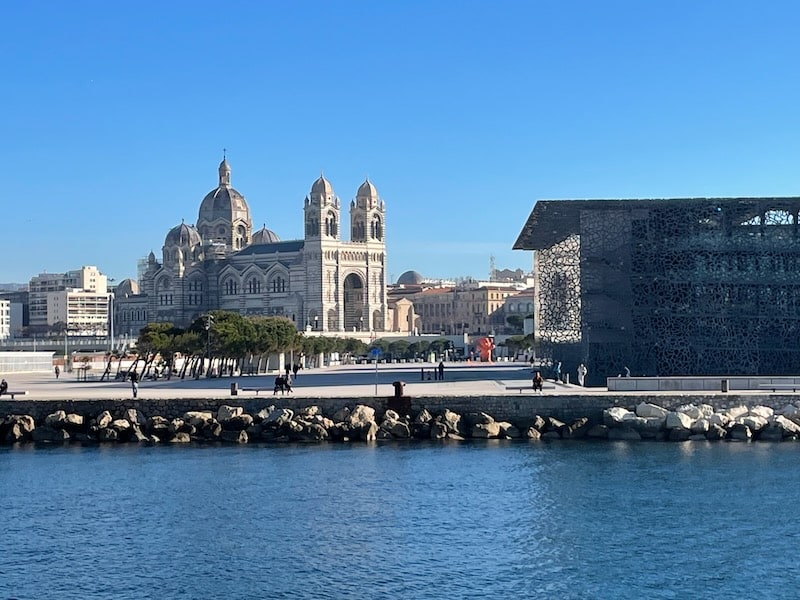 Sailing past La Major Cathedral and the iconic cubic MUCEM ©Leyla Alyanak/OffbeatFrance
Sailing past La Major Cathedral and the iconic cubic MUCEM ©Leyla Alyanak/OffbeatFranceThe city was chosen as the European Capital of Culture and did some serious cleaning up.
A world-class museum – the MUCEM – was inaugurated, the waterfront beautifully restored, and all of a sudden Marseille became the darling of the avant-garde travel press, calling on visitors to stop by and witness the “new Marseille”.
Tourists booked trains by the thousands and tumbled off cruise ships for a taste of one of France’s most authentic cities. They climbed in droves to the hilltop Basilica of Notre-Dame de la Garde, crowded the cafés along the harbor, and explored the “quaint” streets of Le Panier.
So what does this all mean for the individual tourist who is wondering: “Is it safe to visit Marseille?”
Visiting Marseille as an everyday tourist
Frankly, it's a city like any other its size.
You can explore Marseille for weeks and not witness any violence at all. In fact, that’s the most likely scenario.
You’ll visit the main attractions, stroll along the waterfront, admire the views, or catch your breath at the beauty of the Mediterranean coast.
Should you avoid Marseille?
In reality – and pay close attention here – Marseille is no more and no less dangerous than other large cities, in France or elsewhere.
There are some dangerous areas in Paris, but that doesn’t mean you should avoid Paris altogether, does it?
That goes for Marseille too.
Like everywhere, crime isn’t evenly spread, with most violent crime concentrated in some very specific parts of town. Away from those "iffy" districts, life goes on like anywhere else.
Which parts of town are less safe than others?
Most of the violent crime or gang warfare takes place among the social housing estates of the northern districts of Marseille.
If you go up to the Basilica Notre-Dame de la Garde (which of course you will!) look around.
To the north, east and south, you’ll see groups of high-rise buildings. These usually correspond to the neighborhoods which you, as a tourist, might not need to visit. Some of these housing estates, especially the northern ones, tend to be home to some of the drug violence.
As for central Marseille, which you might indeed feel like exploring, a few areas are less frequented by tourists than others. Areas like Noailles and Belsunce, and the train station, should be avoided at night.
This also goes, sadly, for the city’s most famous street, the Canebière, which feels decidedly seedy at night, with people sleeping in doorways and few police in sight. It's a charming street in daytime, so do your exploring while the sun is still up.
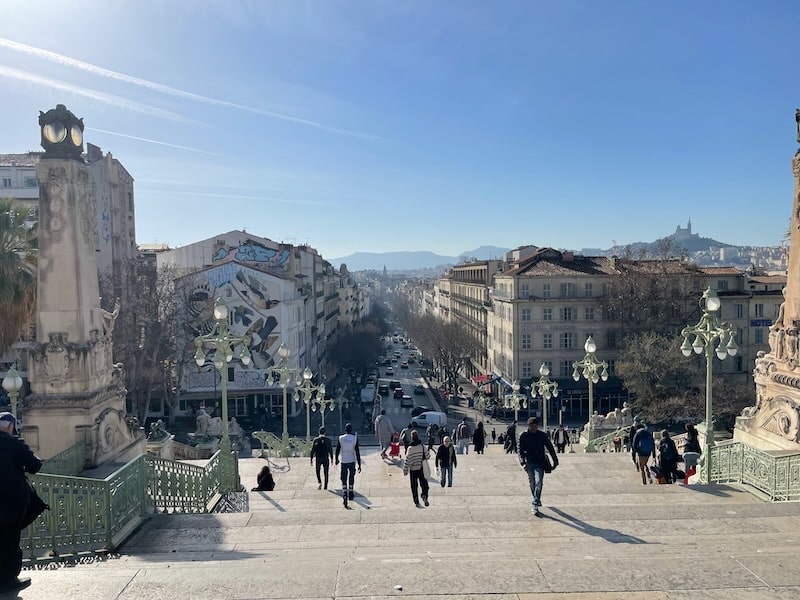 The sweeping stairs leading down from Saint-Charles train station in Marseille. I wandered around at dusk and the area was absolutely fine, but I might avoid it after nightfall ©Leyla Alyanak/OffbeatFrance
The sweeping stairs leading down from Saint-Charles train station in Marseille. I wandered around at dusk and the area was absolutely fine, but I might avoid it after nightfall ©Leyla Alyanak/OffbeatFranceOther areas are fine at night.
The Cours Julien, a popular eating and drinking spot filled with graffiti, is edgy but increasingly trendy during the day; in the evening, a few people hang around the metro station entrance whom you might like to avoid, but I never felt any danger and spent many an evening sampling the eateries here.
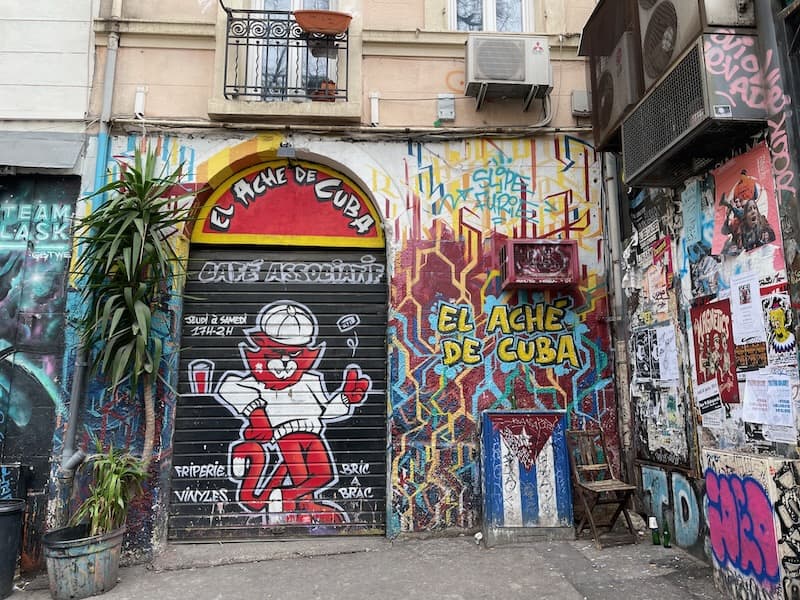
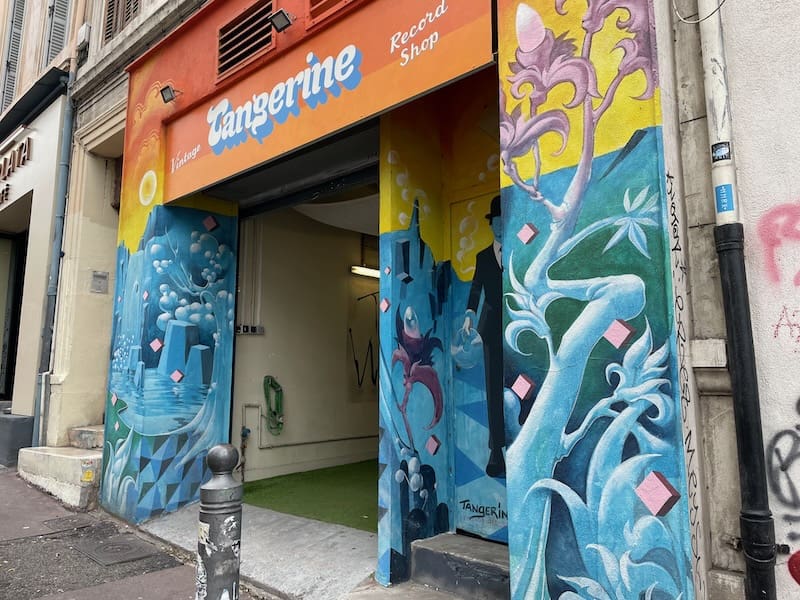 The Cours Julien is becoming ever more trendy. Here, a few of the hundreds of street art and graffiti examples throughout this neighborhood (the header image at the top is also the Cours Julien) ©Leyla Alyanak/OffbeatFrance
The Cours Julien is becoming ever more trendy. Here, a few of the hundreds of street art and graffiti examples throughout this neighborhood (the header image at the top is also the Cours Julien) ©Leyla Alyanak/OffbeatFranceAs for downtown, petty crimes, especially pickpocketing, are a fact of life, as in any city with tourism, so keep your belongings close.
HELP DISCOURAGE PICKPOCKETS WITH THESE TWO ITEMS
- An infinity scarf with an invisible pocket
- A theft-proof cross-body purse
Safety tips in Marseille
So no, I don't consider Marseille to be any more dangerous than other big French cities. That said, here are some tips on how to stay safe, pretty much the same tips I'd provide for travel to any large city.
- Use common sense and leave the bling at home. Take just what you need with you for the day, and don’t be ostentatious. Female solo travelers should take special care because there's no one to watch your belongings while you're otherwise busy.
- Walk around during the day, almost anywhere, but with awareness. In the evening, stick to the areas more frequented by tourists, like the restaurant-lined squares of Le Panier or the cafés that ring the harbor and nearby squares.
- You can’t really paint an entire neighborhood with the same brush, so if you have any doubts, ask before you go somewhere that isn’t in your guidebook. Your hotel should know, or pop into the Tourist Office and ask. I had an evening event in a part of town I wasn’t too comfortable about, and was told it was right next to a police station, which went a way towards assuaging any fears.
- Keep an eye out for petty scams – the gold ring scam, fake petitions, and, of course, pickpocketing.
- Public transportation is fine during the day but I would avoid public transit at night.
- As for places to stay, I would choose the Vieux Port, or Old Port area, which is near plenty of cultural sights and restaurants. Being more touristy, however, also means it is more attractive to pickpockets, so… you know the drill.
- You don't HAVE to stay overnight – there are plenty of things you can do with just one day in Marseille.
- I would also avoid the apartment rentals in Le Panier, however attractive they sound. Short-term rentals are pushing out long-term residents and gentrifying the neighborhood at an alarming rate.
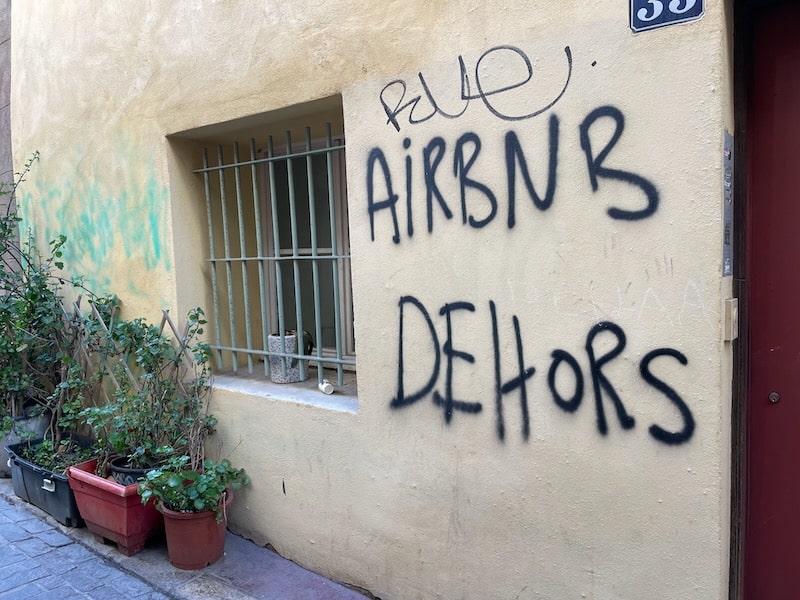 Tempers are fraying in Le Panier as short-term rentals push out long-term residents. This tag says "Out with Airbnb" ©Leyla Alyanak/OffbeatFrance
Tempers are fraying in Le Panier as short-term rentals push out long-term residents. This tag says "Out with Airbnb" ©Leyla Alyanak/OffbeatFranceMarseille today: the truth please!
Let’s be real: Marseille is by no means a pristine city of sparkling streets and quiet voices. It’s messy, screechy and energetic, and dirty in places. Sidewalks can be uneven and certain areas unkempt. If you dislike graffiti and street art, this may not be the place for you. And despite efforts to recruit more police, security continues to be an issue.
It’s a bit contradictory, but while residents may feel insecure and exercise caution when they’re out and about, they’re also fed up with the “dangerous” label that is stuck to them.
Marseille isn’t a laid-back stroll. This is not the France of pretty villages and romantic cafés, although you will find both here.
But if you’re an experienced traveler looking for a vibrant, energetic city, with massive culture and huge diversity – half the population is from somewhere else – then you will be delighted by France’s oldest city.
It has soul and character. It doesn’t glide, it pulsates. Part of you will feel you’re in France, but the rest of you may feel transplanted to Italy or North Africa.
From the cries of fishermen selling fresh catch along the wharf to the graceful curve of the coast or the narrow streets of Le Panier, Marseille stands proudly, rebellious and different.
For Marseille, like Paris, is a moveable feast: once you’ve seen it, it will stick to you, calling you back, over and over.
Did you enjoy this article? I'd love if you shared it!

